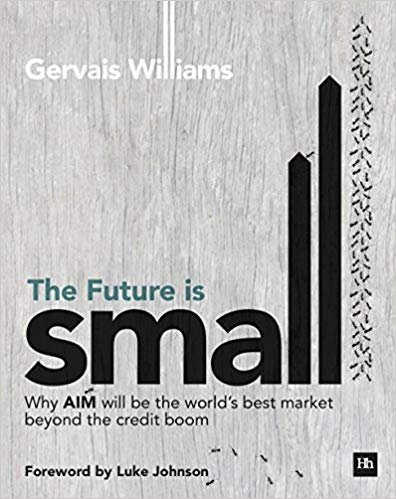Gervais Williams is a UK fund manager who has worked as an equity portfolio manager since 1985. He specialises in small caps and is well known across AIM for running various funds with Miton Group.
When you see Gervais’ funds pop up as a buyer in an RNS, it’s generally a good sign. The author is a serious student of economics and has been highly successful for many years, unlike many armchair academics who claim to understand the stock market yet never make any money in it. Gervais has a genuine track record which has stood the test of time.
Thesis
The book argues that smaller companies have a better risk/ reward ratio than larger companies, because smaller companies are more nimble than large competitors. AIM offers large reward for the apt stockpicker because shares are often illiquid but also inefficient – institutions do not follow a lot of companies on AIM because they are too small. In a world where cheap credit is coming to an end, smaller companies will take advantage of their size and continue to grow, whereas large caps will stagnate and possible even struggle to pay off their debt. Hence, the future is small.
Key Themes
Cheap capital made debt attractive
Deregulation in the 1980s increased the supply of debt, which led to asset appreciation. Debt has been historically attractive because companies can leverage this for a tax shield (interest on debt is deductable from earnings, therefore margin returns are higher). Debt also does not dilute existing shareholders, and so cheap debt became popular.
Debt fuelled global growth
Debt opened up opportunities for companies to access the capital needed in order to invest overseas; this led to centralised operations and lending on an industrial scale but unfortunately made it harder for local businesses to borrow capital. Eventually, smaller UK businesses were neglected in favour of foreign investment.
Small caps became less interesting creating an illiquid and inefficient market
As small caps had little access to institutional capital they began to underperform. It was difficult for them to compete against expansionary companies fuelled by cheap debt, and so institutions withdrew their interest focussing instead on highly liquid stocks. This in turn created an illiquid and inefficient market, where it is difficult to buy and sell large positions, and where stocks are often not reflective of their true value. Institutions have little influence and even less interest. Anyone who has been around AIM for only a few months will know that it is private investors who make up the majority of liquidity on smaller shares.
The future is small
However, this creates opportunity. Private investors have an edge over institutions as we can benefit from position agility, and often buy and sell at will. Smaller companies are also less dependent on the economy and often can have ample room for growth. Furthermore, they are often not laden with debt and some of them can have relatively robust balance sheets.

